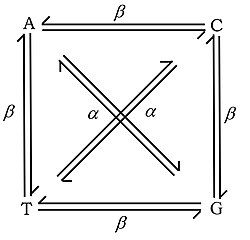Point mutation
A point mutation is a single base substitution.[1] It is the smallest type of mutation possible.
In a point mutation, either:
- a single base nucleotide is changed for another nucleotide of the genetic material (normally DNA),[2] or
- a single base pair is inserted or deleted.[3]
A nonsense mutation is a point mutation in a DNA sequence that leads to an early stop codon.[4] This appears as a nonsense codon in the transcribed mRNA. Most of the time, the protein that is translated from this mRNA does not work.
Point Mutation Media
Schematic of a single-stranded RNA molecule illustrating a series of three-base codons. Each three-nucleotide codon corresponds to an amino acid when translated to protein. When one of these codons is changed by a point mutation, the corresponding amino acid of the protein is changed.
Transitions (Alpha) and transversions (Beta).
References
- ↑ "What is a mutation?". University of Texas, El Passo. Archived from the original on December 3, 2016. Retrieved January 23, 2017.
- ↑ "Glossary: point mutation". Rosalind. Retrieved January 23, 2017.
- ↑ "How DNA changes affect phenotype". National Center for Biotechnology Information, U.S. National Library of Medicine. Retrieved January 23, 2017.
- ↑ Eldon D Enger; Frederick C Ross; David B Bailey, Concepts in Biology, 12th Edition (London: McGraw-Hill, 2007), p. 158
+{{{1}}}−{{{2}}}


